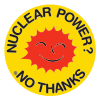Anti-nuclear movement in Austria
This article needs to be updated. The reason given is: The 2012 petition drive took place almost a decade ago. Surely more has happened since then. (October 2021) |
| Anti-nuclear movement |
|---|
 |
| By country |
| Lists |
Construction of the first Austrian nuclear power plant in Zwentendorf on the Danube, about 30 kilometres upstream from the capital, Vienna, began in 1972. Zwentendorf Nuclear Power Plant was designed as a boiling water reactor with a capacity of 700 MW(e), that was expected to generate about 10% of the Austrian electricity production.[1]
Many groups in the public society stood up against this commercial-technical development. From heritage and family-oriented more conservative people to utopian-driven leftists, activists for nature and the environment to critical technicians. They organised in a platform called "IÖAG - Initiative österreichischer Atomkraftwerksgegner" (transliterated: IOeAG), edited a simple DIN A5 brochure "Wie ist das mit den Atomkraftwerken wirklich?" (What is it about the nuclear power plants, really?) and an in volume and circulation growing newspaper, both financed by private members and a selling price. Many activists organised in groups, presented information desks, spoke to passing people visited and contributed offensive to official information events.
However, in June 1978, the Socialist Chancellor Dr. Kreisky, announced a referendum on nuclear power, which was set down for November 5, 1978. The referendum resulted in a narrow majority against the Zwentendorf plant. Nearly two thirds of the voters (3.26 million people) went to the polls and of these 49.5% voted for, and 50.5% against, nuclear power.
Newspapers did not write much about accidents, that already had happened until then. But Verbund - owning the big water power plants (and the grid) in Austria - feared a lowering of the price of electricity by the upcoming of nuclear power and started an advertising campaign in the months before the referendum in "Kronenzeitung". Suddenly this wide circulated newspaper published a series about the history and the accidents of nuclear power.[citation needed]
The Zwentendorf plant was completed but has never produced electricity from nuclear energy.[1][2]
Austrian Chancellor Werner Faymann expects anti-nuclear petition drives to start in at least six European Union countries in 2012 with the goal of having the EU abandon nuclear power. Under the EU's Lisbon Treaty, petitions that attract at least one million signatures can seek legislative proposals from the European Commission. This would pave the way for anti-nuclear activists to increase support.[3]
Organisations
[edit]Platform Against Nuclear Dangers (PLAGE)
[edit]

Platform Against Nuclear Dangers (PLAGE)[4] is a nonprofit organization in Salzburg and belongs to the Anti-nuclear movement in Austria.
The PLAGE was founded on May 20, 1986, shortly after the Chernobyl disaster (April 26, 1986), as a Salzburg platform against the Bavarian Wackersdorf reprocessing plant (WAA).[5] By 1987, 120,000 Salzburg signatures had been collected against the nuclear reprocessing plant (a total of almost 900,000 objections, of which 453,000 were from Austria). In the spring of 1989 the decision was made not to build the reprocessing plant. After the WAA collapsed in 1989, the platform was renamed Platform Against Nuclear Dangers (PLAGE).[6] Today the platform also supports renewable energies.
In 2000, PLAGE erected the resistance monument against the WAA at Mozartplatz in Salzburg. "The Fence of Capital Offence" should commemorate the successful resistance to the WAA 1985-1989 - a civil protest movement, which crossed national frontiers and party lines.
PLAGE criticises existing European treaties, first and foremost EURATOM, under which all EU Members pay for nuclear research whether or not they operate plants.[7] 2020 PLAGE got the European Solar Prize - Category "Media and Communication" - Short video "Quit EURATOM"[8]
anti atom komitee
[edit]The long-term goal is a nuclear power plant-free Europe. The association in Freistadt has set itself the task of preventing the construction and operation of nuclear power plants in Europe. Furthermore, the association provides ideal support for all activities relating to renewable energy sources and alternative energies.[9]
atomstopp_atomkraftfrei leben!
[edit]atomstop_nuclear-free live! is a non-profit, non-partisan association based in Linz. Tey are fighting for a Europe - and ultimately a world - without nuclear power.[10]
Resources
[edit]- Kein Kernkraftwerk in Zwentendorf! - 30 Jahre danach[permanent dead link] (No nuclear power plant in Zwentendorf! - 30 years after) Museum Joanneum Graz, exhibition 01.11.2008-30.01.2009 and book by Sigrid Schönfelder for CLIO and Büro der Erinnerungen, German, visited 23.05.2014
- Kernkraftwerk in Zwentendorf! - 30 Jahre Zwentendorf KulturServer Graz, German, visited 23.05.2014
- Das wichtigste NEIN unseres Lebens - AKW-ABSTIMMUNG Zwentendorf Source: Österreichische Mediathek, Online archive, article about the history and some historic audio documents, German, visited 23.05.2014
- Akustische Chronik 1977-1978 Source: Österreichische Mediathek, Online Archive, German, visited 23.05.2014
- 30 Jahre Zwentendorf: Ausstellung in Graz Exhibition announcement - Kleine Zeitung, 31.10.2008, German, visited 23.05.2014
See also
[edit]- The Greens – The Green Alternative
- Hildegard Breiner
- Robert Jungk
- Freda Meissner-Blau
- Energy in Austria
- Nuclear power phase-out
- Viki Weisskopf
References
[edit]- ^ a b Austria's no to nuclear power
- ^ "Austria's Anti-Nuclear Crusade" (PDF). Archived from the original (PDF) on 2016-04-22. Retrieved 2009-02-03.
- ^ "Austria expects EU anti-nuclear campaign this year". Reuters. Mar 12, 2012.
- ^ Official website PLAGE
- ^ Einige Eckdaten des österreichischen Widerstands gegen die WAA - (Radi Aktiv, nr 13, April 1987, p.64f. bei Laka (Archiv))
- ^ PLAGE 1978-1989
- ^ Living with nuclear power plants at your border in: Euractiv 18. Januar 2022
- ^ Quit EURATOM - PLAGE-video on YouTube
- ^ Official website anti atom komitee
- ^ Official website atomstopp_atomkraftfrei leben!
